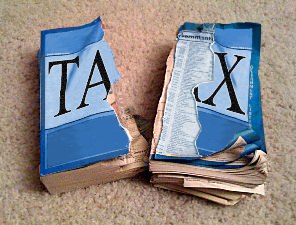James Murphy has watched in frustration as his school property tax bill has risen year after year.
“It goes up $200 or $300 a year,” said Murphy, of Media. “There’s no control over it. With them, it’s just spend, spend, spend, spend.”
Murphy is a member of the Rose Tree Media Taxpayers United, a grassroots group that advocates for controlled school spending and property tax reform. The group supports efforts to eliminate school property taxes while raising other state taxes.
“We would like to see … where the taxpayers don’t have to pay the real estate taxes anymore,” Murphy said. “It should be controlled by the state to equally fund all of the public schools in Pennsylvania.”
Property tax reform is hardly a new issue, nor is it one lacking ideas for change. Agreeing on practical solution, however, has troubled the state Legislature for years.
Most reform bills floating around Harrisburg are iterations of proposals that have been discussed repeatedly. They range from eliminating school property taxes completely to freezing them for senior citizens. Passage of any reform bill is not imminent.
“A lot of times, people are very reluctant because in any sweeping legislation, people aren’t always sure how it’s going to work out,” said state Rep. Nick Miccarelli, R-162, of Ridley Park. “People are in it sometimes to take a step. But big steps are the only things that are going to solve this problem. I think it’s been going on for so long that there’s no other ways than making big moves.”
Miccarelli was among three Delaware County representatives who voted last year in favor of a proposal to eliminate school property taxes. The plan sought to make up the revenue by increasing the state income and sales taxes.
It faced heavy bipartisan opposition from House members who claimed the numbers did not add up. When the plan appeared last fall as an amendment to another bill, it failed by a 138-59 vote.
Miccarelli was joined by state Reps. Stephen Barrar, R-160, of Upper Chichester, and Margo Davidson, D-164, of Upper Darby, in supporting the bill.
“It was a bold bill that showed there were legislators willing to put a tough vote to get something done on this issue,” Barrar said. “Property taxes have been the most elusive goal of the Legislature for the past 30 or 40 years.”
State Rep. Greg Vitali, D-166, of Haverford, said eliminating school property taxes may be popular, but is probably unrealistic. He worried that eliminating property taxes could affect the quality of education offered by school districts in his legislative district.
“I would be wary of any proposal that really endangers the ability of these school districts to maintain their high standards,” Vitali said. “People make choices on where to live based on the amenities that a community has to offer. … I’m very wary of plans that would run all the money through the state and send it back in perhaps a different way.”
The House instead voted to pass House Bill 1189, better known as the “local option” bill. The bill enables school districts to enact earned income, mercantile and business privilege taxes for the sole purpose of reducing the district’s millage rate on a dollar-for-dollar basis.
That bill, which passed by a 149-46 vote, has joined several property tax reform bills that already are sitting within the Senate Finance Committee. The others include a pair of bills seeking to freeze property taxes for senior citizens and Senate Bill 76, the Senate’s version of the school property tax elimination legislation.
State Sen. Mike Brubaker, chairman of the Senate Finance Committee, said the majority of interest has centered on SB 76 and the legislation freezing property taxes. Yet, each of the bills need work before they can be voted out of committee.
The challenge in passing property tax reform, Brubaker said, is ensuring legislators are comfortable with the revenue figures involved. Property taxes are more stable than the state sales and income taxes.
“We’re walking away from the stable and predictable form and going to more variable forms,” said Brubaker, R-36, of Lancaster County. “It potentially puts the funding of critical government investments, like education, in a bit of a predicament if we don’t have reserves. … We have to ensure that the revenues necessary to operate are going to be there.”
Senate Majority Leader Dominic Pileggi, R-9, of Chester, said there is an increasing realization that eliminating property taxes does not eliminate the tax burden. Instead, tax reform shifts the burden from one person to another. Some benefit while others feel a heavier burden.
“The people who are harmed by that (shift) resist that change,” Pileggi said. “The people who benefit by that shift advocate for the change. That’s the tension that occurs many times when you talk about reform.”
Pileggi has sponsored Senate Bill 299, which would freeze school property taxes for residents who are at least 65 years old and have qualified for a Homestead exemption for at least five years. The bill also would reimburse school districts for the revenue lost. A source for that reimbursement funding is needed to move the bill forward.
State Rep. Thaddeus Kirkland, D-159, of Chester, said he would support such a bill if one made its way to the House. He suggested the reimbursement funding be generated by taxing Marcellus Shale — a revenue policy advocated by many Democrats. Republican Gov. Tom Corbett has opposed new taxes on Marcellus Shale.
“That would be something I’d be more than willing to support,” said Kirkland, who voted against both the school property tax elimination proposal and the local option bill. “We have to find a way that we can take care of our seniors and maintain our schools.”
Kirkland said legislators have to be honest and realistic if reform is going to be passed.
“It’s been an issue that’s been ongoing,” Kirkland said. “It’s been an issue that we need to address with the right kind of deals and the right leadership.”
Agencies
 Canada Journal – News of the World Articles and videos to bring you the biggest Canadian news stories from across the country every day
Canada Journal – News of the World Articles and videos to bring you the biggest Canadian news stories from across the country every day



